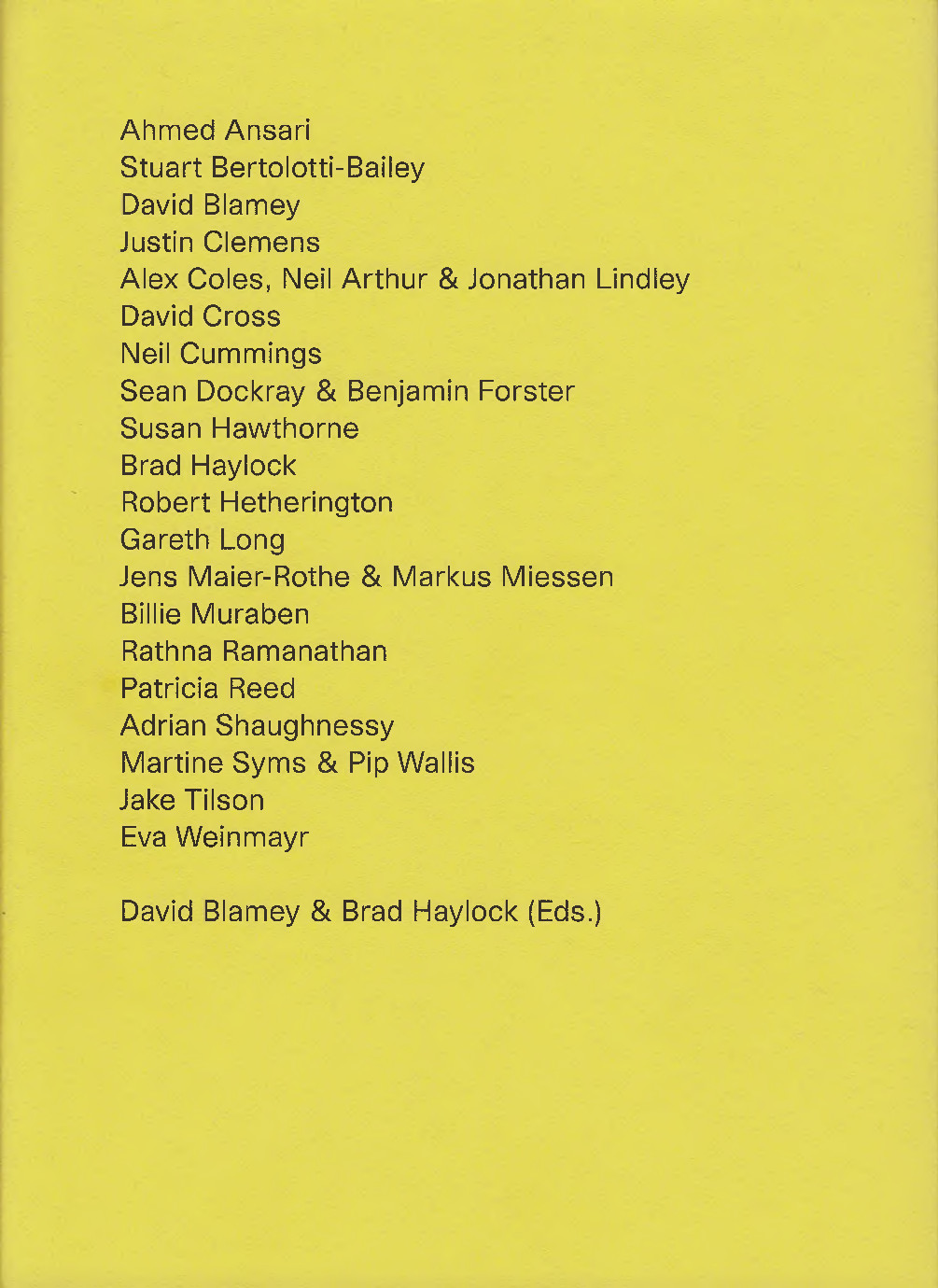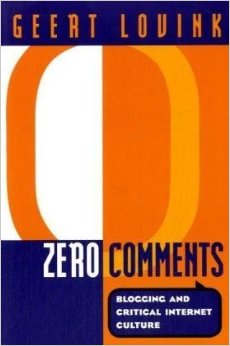David Blamey, Brad Haylock (eds.): Distributed (2018)
Filed under book | Tags: · cultural production, distributed aesthetics, distribution, knowledge, sharing

“The power of knowledge lies not only in generating ideas, but also in controlling their dispersion. For those who would seek to influence others, the dissemination of ideas is paramount. For those looking to protect the fruits of intellectual labor for reasons of profit or ethics, distribution is something to control. Either way, distribution is a key concern across the spectrum of cultural production, particularly at a time when digital networks have facilitated an unprecedented access to audiences.
Bringing together contributors from a variety of backgrounds, Distributed presents the act of distribution as a subject of significant social and economic importance and argues that it merits serious creative consideration. From the attention-seeking impulse of the “influencer” to the democratization of art via books, performances, videos or sound, the increased urge to disseminate is explored here as an elemental phenomenon of our time.”
Texts by Ahmed Ansari, Stuart Bertolotti-Bailey, Justin Clemens, Alex Coles, Jonathan Lindley, Neil Cummings, Arnaud Desjardin, Markus Miessen, Sean Dockray & Benjamin Forster, Billie Muraben, Patricia Reed, Adrian Shaughnessy, Freek Lomme, Eva Weinmayr, et al.
Publisher Open Editions, London, 2018
ISBN 9780949004093
252 pages
Fibreculture Journal 1-15 (2003-2009)
Filed under journal | Tags: · convergence, creative industries, distributed aesthetics, education, innovation, internet, labour, media, media art, media culture, mobility, networks, new media, new media art, remix, research, web 2.0

Fibreculture Journal is a peer reviewed international journal that explores the issues and ideas of concern and interest to both the Fibreculture network and wider social formations. The journal encourages critical and speculative interventions in the debate and discussions concerning information and communication technologies and their policy frameworks, network cultures and their informational logic, new media forms and their deployment, and the possibilities of socio-technical invention and sustainability. Other broad topics of interest include the cultural contexts, philosophy and politics of information and creative industries; national and international strategies for innovation, research and development; education; media and culture, and new media arts.
What Now? : The Imprecise and Disagreeable Aesthetics of Remix
Fibreculture 15, 2009
View (HTML articles)
Web 2.0: Before, During and After the Event
Fibreculture 14, 2009
Edited by Darren Tofts and Christian McCrea
View (HTML articles)
After Convergence: What Connects?
Fibreculture 13, 2008
Edited by Caroline Bassett, Maren Hartmann, Kate O’Riordan
View (HTML articles)
Models, Metamodels and Contemporary Media
Fibreculture 12, 2008
Edited by Gary Genosko and Andrew Murphie
View (HTML articles)
The Futures of Digital Media Arts and Culture
Fibreculture 11, 2008
Edited by Andrew Hutchison and Ingrid Richardson
View (HTML articles)
New Media, Networks and New Pedagogies
Fibreculture 10, 2007
Edited by Adrian Miles
View (HTML articles)
General Issue
Fibreculture 9, 2006
Edited by Andrew Murphie
View (HTML articles)
Gaming Networks
Fibreculture 8, 2006
Edited by Chris Chesher, Alice Crawford and Julian Kücklich
View (HTML articles)
Distributed Aesthetics
Fibreculture 7, 2005
Edited by Lisa Gye, Anna Munster and Ingrid Richardson
View (HTML articles)
Mobility, New Social Intensities, and the Coordinates of Digital Networks
Fibreculture 6, 2005
Edited by Andrew Murphie, Larissa Hjorth, Gillian Fuller and Sandra Buckley
View (HTML articles)
Multitudes, Creative Organisation and the Precarious Condition of New Media Labour
Fibreculture 5, 2005
Edited by Brett Neilson and Ned Rossiter
View (HTML articles)
Contagion and the Diseases of Information
Fibreculture 4, 2005
Edited by Andrew Goffey
View (HTML articles)
General Issue
Fibreculture 3, 2004
Edited by Andrew Murphie
View (HTML articles)
New Media, New Worlds?
Fibreculture 2, 2003
Edited by Andrew Murphie
View (HTML articles)
The Politics of Networks
Fibreculture 1, 2003
Edited by Andrew Murphie
View (HTML articles)
Fibreculture Journal: Internet theory + criticism + research
Publisher: Fibreculture Publications/Open Humanities Press, Australia
ISSN: 1449 – 1443
Geert Lovink: Zero Comments: Kernels of Critical Internet Culture (2007)
Filed under book | Tags: · blogging, collaboration, distributed aesthetics, internet, internet culture, media theory, net criticism, networks, web 2.0

In Zero Comments Geert Lovink upgrades worn-out concepts and inquires the latest Web 2.0 hype around blogs, wikis and social network sites. In this third volume of his studies into critical Internet culture, Lovink develops a ‘general theory of blogging.’ Unlike most publications he is not focusing on the dynamics between bloggers and the mainstream news media. Instead of celebrating ‘citizen journalism’ blogs are analyzed in their ‘nihilist impulse’ to empty out established meaning structures. Blogs bring on decay of the 20th century broadcast media, and are proud of their in-crowd aspect in which linking, tagging and ranking have become the main drivers. The book also deals with the silent globalization of the Net in which no longer the West, but countries like India, China and Brazil are becoming main players in new media culture. It is not only the latest that Internet enthusiasts should focus on. Zero Comments upgrades concepts such as global Internet time, tactical media, the crisis of new media arts and the problematic relationship between architecture and the Net. The book ends with speculative notions on concepts such as organized networks, free cooperation and distributed aesthetics.
Publisher Routledge, 2007
ISBN 0415973155, 9780415973151
312 pages

